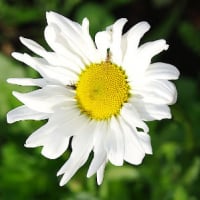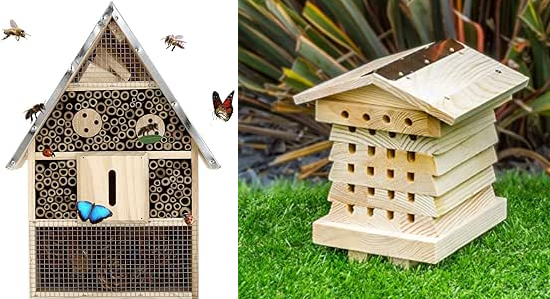This Forum will close on Wednesday 27 March, 2024. Please refer to the announcement on the Discussions page for further detail.
I stop using bee hotels
 Simone_in_Wiltshire
Posts: 1,073
Simone_in_Wiltshire
Posts: 1,073
I have two types of bee hotels. One of them can be opened to clean it, the other 3 typical builds - in the picture on the left - which you can find all over the place.
Problem with the common one is that they cannot be opened and bees can't be checked.
Having the better hotel in the second year, it was not used much last year, I opened it and checked what's inside.
The first row from the bottom had leaf-cutter bees and 75% other bees and at closer inspection, the bees were in a quite devastating condition. I actually found only 4 which were okay.
Opening the second row from the bottom, here is were the drama started. Almost all bees were either destroyed by white worms or had other issues like mould. The higher up I came, the more devastating was the result.
I then took one of the common bee hotels and noticed that I have simply no chance to get the cocoons out without destroying them. Knowing the condition from the better hotel, who knows what dramas happened here.
I remember that one comment (or discussion) that I had found a few years ago, where somebody warned that bee hotels are a death trap and warned not to use them. Almost all other comments contradicted him and a kind of "let nature do what it wants" mood was mentioned several times.
After reading that discussion, I opened the following April one tube to found a bee alive, and I was convinced that it was all good.
After today's experience, I finally learned my lesson.
I have done and will do everything to support the bees as far as flowers and variety are concerned, but no more bug/bee hotels. I let nature do what it wants and I'm sure they will find a place on their own without my involvement.
As soon as bees see these bamboo sticks, they start using them, following an instinct which is however not planned and constructed as our bee hotels. Nature doesn't provide well-sorted bamboo sticks. I have to assume that bees were happy keeping their stock alive without bee hotels.
While cleaning the hotel, I even thought "who knows why they are in decline, probably since we offer them these hotels".

Problem with the common one is that they cannot be opened and bees can't be checked.
Having the better hotel in the second year, it was not used much last year, I opened it and checked what's inside.
The first row from the bottom had leaf-cutter bees and 75% other bees and at closer inspection, the bees were in a quite devastating condition. I actually found only 4 which were okay.
Opening the second row from the bottom, here is were the drama started. Almost all bees were either destroyed by white worms or had other issues like mould. The higher up I came, the more devastating was the result.
I then took one of the common bee hotels and noticed that I have simply no chance to get the cocoons out without destroying them. Knowing the condition from the better hotel, who knows what dramas happened here.
I remember that one comment (or discussion) that I had found a few years ago, where somebody warned that bee hotels are a death trap and warned not to use them. Almost all other comments contradicted him and a kind of "let nature do what it wants" mood was mentioned several times.
After reading that discussion, I opened the following April one tube to found a bee alive, and I was convinced that it was all good.
After today's experience, I finally learned my lesson.
I have done and will do everything to support the bees as far as flowers and variety are concerned, but no more bug/bee hotels. I let nature do what it wants and I'm sure they will find a place on their own without my involvement.
As soon as bees see these bamboo sticks, they start using them, following an instinct which is however not planned and constructed as our bee hotels. Nature doesn't provide well-sorted bamboo sticks. I have to assume that bees were happy keeping their stock alive without bee hotels.
While cleaning the hotel, I even thought "who knows why they are in decline, probably since we offer them these hotels".

I ♥ my garden.
3
Posts
https://www.bumblebeeconservation.org/how-do-bumblebees-hibernate/
and also how to build a potential bumblebee nest
https://www.bumblebeeconservation.org/bumblebee-nests/#provide
In the sticks near Peterborough
We have lots of wild corners and if and when I cut down any hollow stemmed plants, I leave the stems where they fall or sometimes put them in bundles behind some old trellis.
East facing, top of a hill clay-loam, cultivated for centuries (7 years by me). Birmingham
I ♥ my garden.
That's why it's good to look at the science.